Do International Organizations Listen to CSOs?
This was a central question posed by CIVICUS in its recent report, “Beyond our Two Minutes: State of Civil Society / Intergovernmental Organization Scorecard”. This first of a kind report considered the mechanisms for and effectiveness of the civil society engagement policies in ten prominent international organizations, including the World Bank Group (WBG). It was published as part of the “State of Civil Society Report for 2014” which has become an annual flagship report on the status of civil society worldwide.
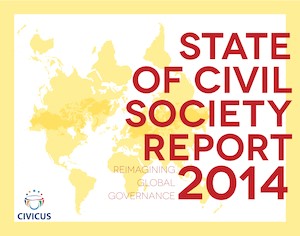 The IGO Scorecard assessed the following IGOs: FAO, OHCHR, ILO, UNAIDS, UNDP, UNHCR, UN Women, WBG, WFP, WTO. The study assessed the civil society outreach policies and practices of the IGOs around four aspects and specifically: access, policy, programs, and empowerment. The perception survey was based on two online questionnaires which CIVICUS sent out earlier this year, one geared to CSO representatives and the other for IGO staff. CIVICUS received a total of 462 responses from CSOs (including 52 which commented on the WBG), and some 200 responses from IGO staff (including 26 from WBG staff).
The IGO Scorecard assessed the following IGOs: FAO, OHCHR, ILO, UNAIDS, UNDP, UNHCR, UN Women, WBG, WFP, WTO. The study assessed the civil society outreach policies and practices of the IGOs around four aspects and specifically: access, policy, programs, and empowerment. The perception survey was based on two online questionnaires which CIVICUS sent out earlier this year, one geared to CSO representatives and the other for IGO staff. CIVICUS received a total of 462 responses from CSOs (including 52 which commented on the WBG), and some 200 responses from IGO staff (including 26 from WBG staff).
Overall, the study found that global governance has undergone “incredible transformation” over the past 20-30 years and there is much more space for civil society to access global organizations today. It notes that “where once IGOs had to justify the inclusion of CSOs in their work, today it is the exclusion of CSOs that requires justification”. It cites as an example the fact that the number of CSOs accredited with the United Nations grew from less than 100 in 1950 to over 3,900 today. Yet the report found that it is not clear how seriously IGOs take civil society outreach, and how much influence CSO leaders exert beyond their ‘two minute’ plenary speeches at UN conferences. The Scorecard found that IGO civil society ‘focal points’ also express concern about how effective their own outreach is, as well as feel that CSOs often lack the technical capacity and skills to influence IGO policies.
Among the specific findings of the Scorecard was the fact that the three most commonly identified obstacles were: member states overriding CSO voices; consultations that had no discernable outcomes; and weaknesses in the outreach mechanisms of IGOs. Conversely, the three priorities cited for improving these approaches were: greater focus on local or regional outreach; need to engage a wider group of CSOs; and the need for more decentralized CSO outreach strategies. It was interesting to note the difference in the priorities for engagement between CSOs and those who work within IGOs. While CSO representatives complained of the lack of access and influence, IGO staff called for greater CSO capacity and pragmatism to engage.
The World Bank Group rated 5th or in the middle of the ranking. The report acknowledged the efforts made by the Bank to engage civil society on various levels of its engagement continuum, and cited the two most recent CSO engagement initiatives: the Global Partnership for Social Accountability (GPSA) and Citizens Engagement Framework. The most frequent ‘obstacles’ cited for the WBG’s efforts to engage CSOs were: i) consultations seem to have no tangible outcomes; ii) outreach mechanisms not accessible enough; and iii) governments override CSO voices. On a positive note, the CSO respondents acknowledged their substantive engagement with WBG staff during the Annual Meetings and the Bank’s increased commitments to consult on new or revised policies.
While this first edition of the Scorecard was based on a relatively limited survey sample and was short on details about each IGO, it represents a significant step in assessing the growing role of CSOs within global organizations. It seems to build on the methodology adopted by UK-based One World Trust in their ground-breaking Global Accountability Report of a few years back which also assessed the participation, access, and compliance mechanisms of international organizations. The difference is that the CIVICUS report focuses directly on IGO civil society engagement policies and practices, and also cross-references the perspectives of staff from both CSOs and IGOs.
Many of these IGOs, including the WBG, have been engaging civil society for decades now with varying degrees of intensity and success, and this IGO Scorecard represents the first time that these approaches are being assessed and rated across the institutional spectrum. As the Scorecard is expanded to include other IGOs and refines its methodology going forward, I am sure that it will be quite useful to both CSO and IGO staff trying to move these relations beyond speech-making and policy dialogue, to effective operational collaboration around the world.
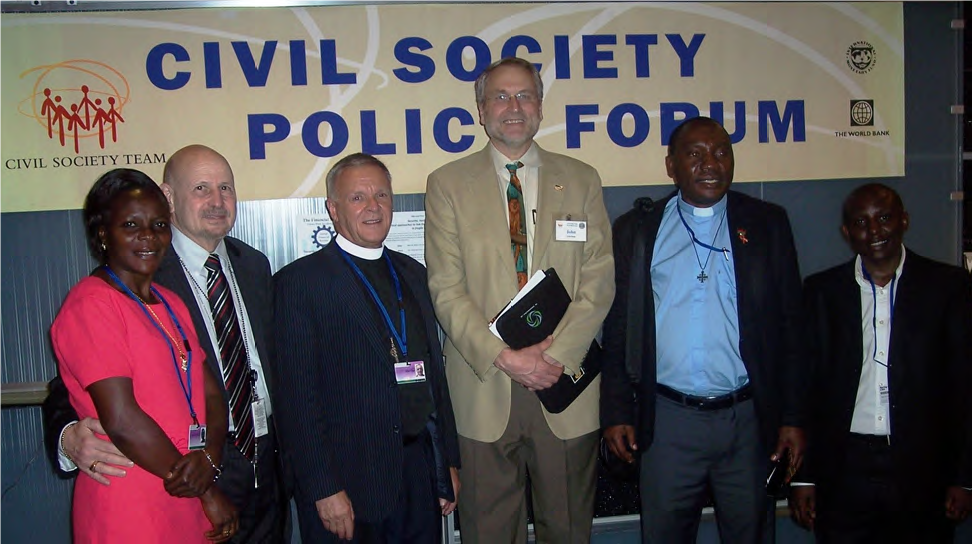 The World Bank Group (WBG) is increasing its engagement with the Lesbian, Gay, Bisexual, and Transgendered (LGBT) community as part of its civil society engagement efforts at the global level. This comes as the campaign to reduce descrimination and promote inclusion of the LGBT community gains traction and visibility in the United States and many countries around the world. This interaction began last year when several CSOs reached out to the Global Civil Society Team to suggest introducing the LGBT issue within the WBG – CSO policy dialogue agenda. As a result, the Bank hosted a session on LGBT coalition building during the 2013 Spring Meetings in April, and this was followed by a session on incorporating LGBT issues within Bank social assessments at the Annual Meetings in October. In addition, the Bank sponsored an LGBT leader from Guyana to come to Washington for the week-long
The World Bank Group (WBG) is increasing its engagement with the Lesbian, Gay, Bisexual, and Transgendered (LGBT) community as part of its civil society engagement efforts at the global level. This comes as the campaign to reduce descrimination and promote inclusion of the LGBT community gains traction and visibility in the United States and many countries around the world. This interaction began last year when several CSOs reached out to the Global Civil Society Team to suggest introducing the LGBT issue within the WBG – CSO policy dialogue agenda. As a result, the Bank hosted a session on LGBT coalition building during the 2013 Spring Meetings in April, and this was followed by a session on incorporating LGBT issues within Bank social assessments at the Annual Meetings in October. In addition, the Bank sponsored an LGBT leader from Guyana to come to Washington for the week-long 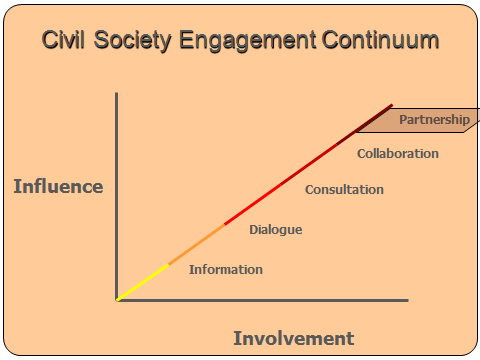 As can be expected, this last step on the civil society engagement continuum has been the most difficult for the World Bank to achieve over the years. This is because institutional partnerships necessarily involve common goals, shared decision making, and even long term relations. While there are a number of examples of Bank – CSO partnerships in the areas of education, health, and environment, many of these are still ad hoc and pilot in nature. Nonetheless, as the latest edition of the
As can be expected, this last step on the civil society engagement continuum has been the most difficult for the World Bank to achieve over the years. This is because institutional partnerships necessarily involve common goals, shared decision making, and even long term relations. While there are a number of examples of Bank – CSO partnerships in the areas of education, health, and environment, many of these are still ad hoc and pilot in nature. Nonetheless, as the latest edition of the 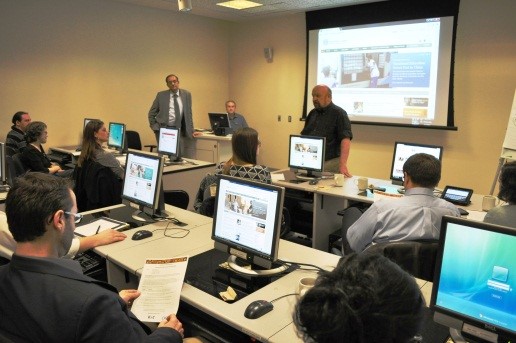 mechanisms.
mechanisms.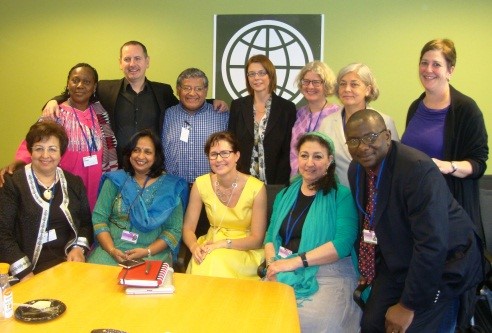 Between 2010 and 2012, however, CSOs were invited for the first time to serve in a decision making capacity in several new large funding mechanisms managed by the bank. The first was the
Between 2010 and 2012, however, CSOs were invited for the first time to serve in a decision making capacity in several new large funding mechanisms managed by the bank. The first was the 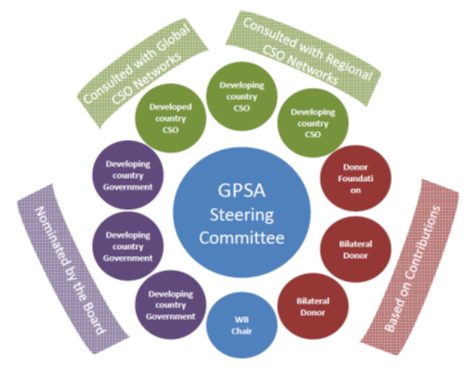 The most recent and promising case of CSOs being offered a deliberative role is the
The most recent and promising case of CSOs being offered a deliberative role is the 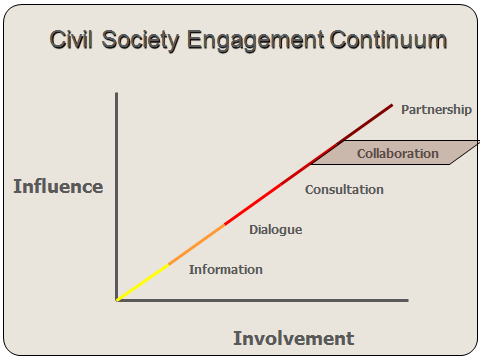 Operational collaboration between the World Bank and CSOs has grown significantly over the past two decades in such areas of health, education, and environment. Yet, because it largely occurs at the country level and within Bank-finance projects, this expanding collaboration is often not fully visible in Washington. As the latest edition of the
Operational collaboration between the World Bank and CSOs has grown significantly over the past two decades in such areas of health, education, and environment. Yet, because it largely occurs at the country level and within Bank-finance projects, this expanding collaboration is often not fully visible in Washington. As the latest edition of the 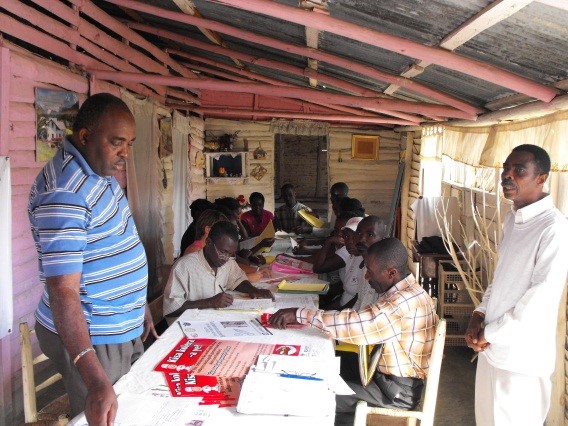 The Bank and CSOs also expanded their collaboration around disaster risk management and humanitarian relief as the world witnessed an increase in natural disasters. The
The Bank and CSOs also expanded their collaboration around disaster risk management and humanitarian relief as the world witnessed an increase in natural disasters. The 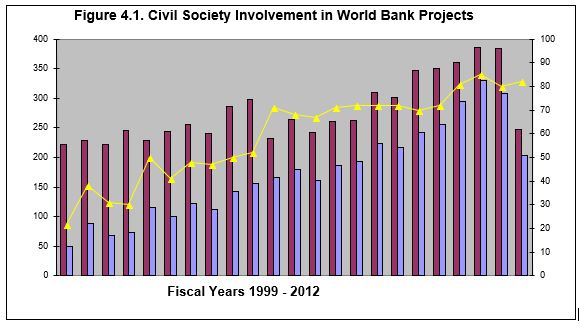
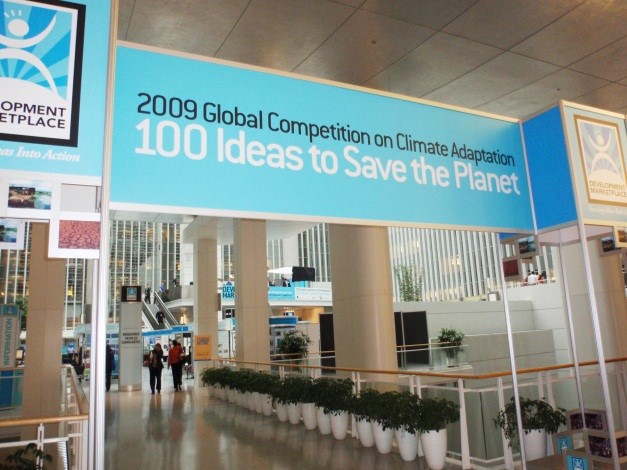 For a copy of the Civil Society Review full report and copies of the Executive Summary in six languages (Arabic, Chinese, English, French, Russian, and Spanish) please visit the civil society engagement
For a copy of the Civil Society Review full report and copies of the Executive Summary in six languages (Arabic, Chinese, English, French, Russian, and Spanish) please visit the civil society engagement 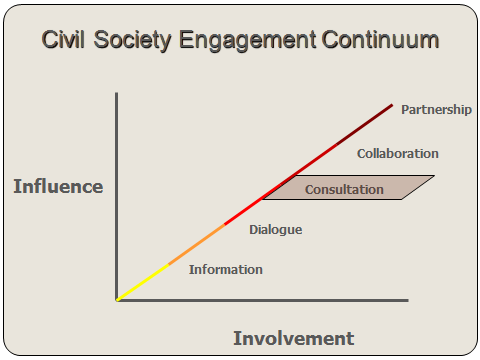 The Bank has learned a good deal about how to consult civil society over the years. The absence of consultation policies led to some of the most visible CSO advocacy campaigns opposing Bank-financed projects, such as the Narmada Dam in India and the Polonoreste Project in the Brazilian Amazon in the 1980s. Thus, while this third step on the civil society engagement continuum has been one of the most difficult to ascend, it has also shown the clearest progress in terms of more effective consultation practices. As the latest edition of the
The Bank has learned a good deal about how to consult civil society over the years. The absence of consultation policies led to some of the most visible CSO advocacy campaigns opposing Bank-financed projects, such as the Narmada Dam in India and the Polonoreste Project in the Brazilian Amazon in the 1980s. Thus, while this third step on the civil society engagement continuum has been one of the most difficult to ascend, it has also shown the clearest progress in terms of more effective consultation practices. As the latest edition of the 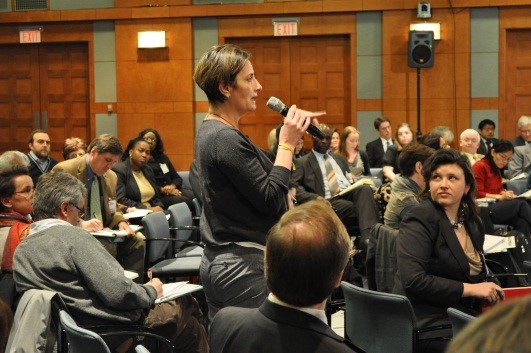 and projects worldwide.
and projects worldwide.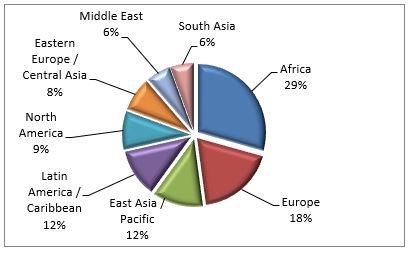
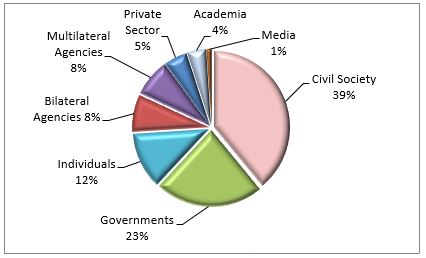
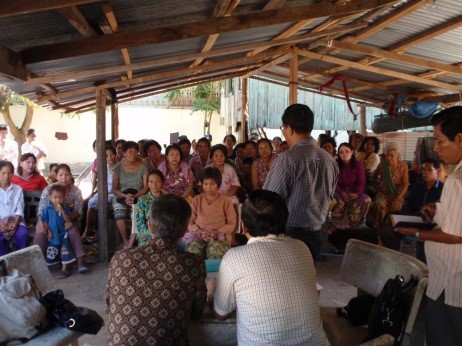 Although consultations at the global and regional levels are more visible, the most intense and ongoing levels of consultations occur at the country level, where the Bank carries out most of its development work. The most important consultations undertaken at the country level were related to the drafting of
Although consultations at the global and regional levels are more visible, the most intense and ongoing levels of consultations occur at the country level, where the Bank carries out most of its development work. The most important consultations undertaken at the country level were related to the drafting of 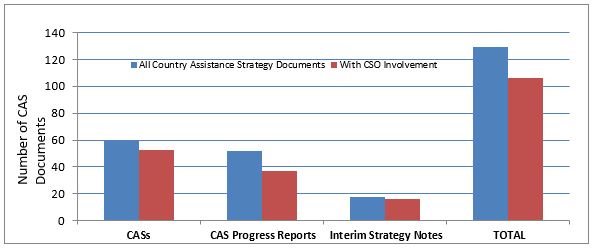
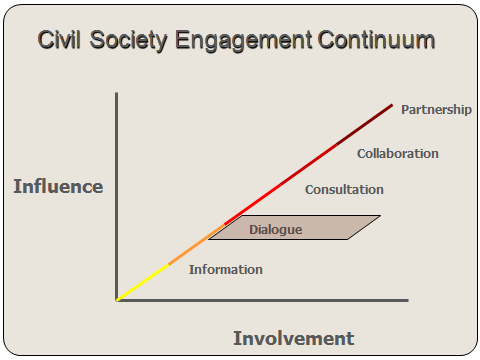 Of all the steps on the World Bank – civil society engagement continuum, policy dialogue has experienced the greatest advances over the years. As highlighted in the latest edition of the
Of all the steps on the World Bank – civil society engagement continuum, policy dialogue has experienced the greatest advances over the years. As highlighted in the latest edition of the 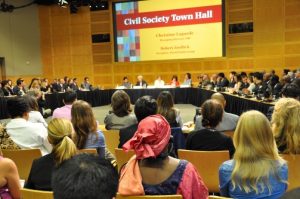
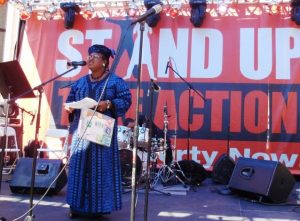 The Bank also engaged in policy dialogue by hosting CSO book launches at its
The Bank also engaged in policy dialogue by hosting CSO book launches at its 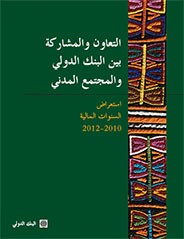 استعراض مشاركة البنك الدولي مع المجتمع المدني للسنوات المالية 2010 – 2012
استعراض مشاركة البنك الدولي مع المجتمع المدني للسنوات المالية 2010 – 2012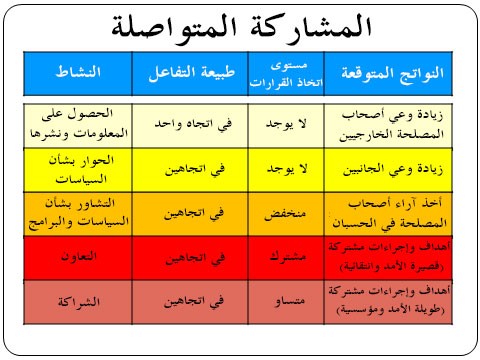
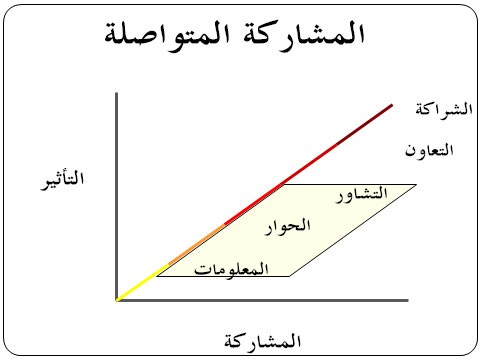
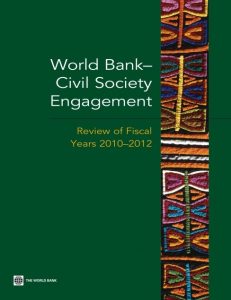
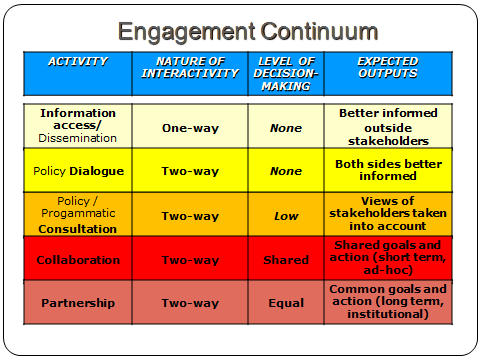
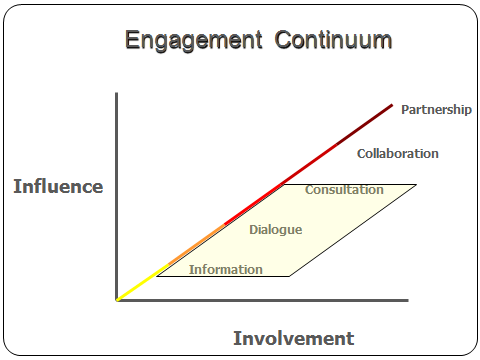
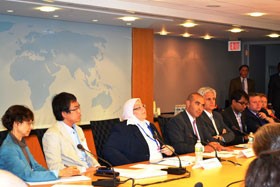

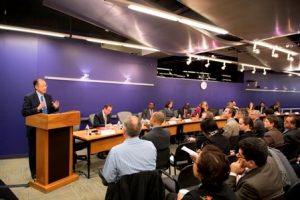 El Comité Directivo de la GPSA fue convocado por primera vez el 17 de diciembre de 2012 y se reunió en una mesa redonda encabezada por el presidente del Banco, Jim Yong Kim. (Ver la foto). Este encuentro titulado “Auditoría social y ciencia de la prestación de servicios” congregó a representantes de Gobiernos, OSC, organizaciones de donantes, y personal del Banco para debatir el tema de la mejora de la eficacia de la prestación de servicios a fin de responder mejor a las necesidades de los ciudadanos. Los panelistas intercambiaron diferentes experiencias nacionales que mostraron que cuando se escucha a los ciudadanos y los Gobiernos rinden cuentas, la prestación de servicios es más eficaz y sostenible. “Con la Alianza Global para la Auditoría Social, el Banco cuenta ahora con un instrumento eficaz para complementar la labor de los Gobiernos y el sector privado en la búsqueda de soluciones para acabar con la pobreza y aumentar la prosperidad compartida”, declaró el presidente Kim. El Comité Directivo celebró el mismo día su primera reunión de planificación para debatir la estrategia de la GPSA para el primer año, los procedimientos de concesión de donaciones, y un marco para la medición de los resultados.
El Comité Directivo de la GPSA fue convocado por primera vez el 17 de diciembre de 2012 y se reunió en una mesa redonda encabezada por el presidente del Banco, Jim Yong Kim. (Ver la foto). Este encuentro titulado “Auditoría social y ciencia de la prestación de servicios” congregó a representantes de Gobiernos, OSC, organizaciones de donantes, y personal del Banco para debatir el tema de la mejora de la eficacia de la prestación de servicios a fin de responder mejor a las necesidades de los ciudadanos. Los panelistas intercambiaron diferentes experiencias nacionales que mostraron que cuando se escucha a los ciudadanos y los Gobiernos rinden cuentas, la prestación de servicios es más eficaz y sostenible. “Con la Alianza Global para la Auditoría Social, el Banco cuenta ahora con un instrumento eficaz para complementar la labor de los Gobiernos y el sector privado en la búsqueda de soluciones para acabar con la pobreza y aumentar la prosperidad compartida”, declaró el presidente Kim. El Comité Directivo celebró el mismo día su primera reunión de planificación para debatir la estrategia de la GPSA para el primer año, los procedimientos de concesión de donaciones, y un marco para la medición de los resultados.